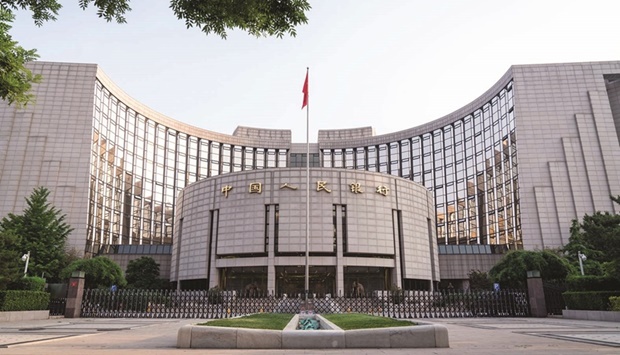Chinese banks will likely trim their benchmark loan prime rates on Monday for the first time in months to help spur borrowing demand and reverse a sharp slump in consumer and business sentiment.
The one-year loan prime rate - the de facto benchmark lending rate for banks - is expected to be cut by 10 basis points to 3.6%, according to all 20 economists polled by Bloomberg. That would be the first reduction in that rate since January.
Economists are more divided on the five-year LPR, a reference for mortgage costs. The median estimate is for a 10-basis point reduction to 4.35%, though seven of the 20 economists expect that rate to be trimmed by an even larger margin of 15 points. Lenders last reduced the long-term loan rate in May by 15 basis points, a record.
The LPRs are based on interest rates that 18 banks offer their best customers and are quoted as a spread over the central bank’s rate on its one-year policy loans, known as the medium-term lending facility. The People’s Bank of China (PBoC) unexpectedly cut the MLF rate by 10 basis points on August 15, which should prompt lenders to ease their loan rates too.
China reported troubling data earlier this week that indicated the economic slowdown is deepening as Covid outbreaks spread and a property crisis worsens. Recent credit data also shows corporates and households were reluctant to borrow in July given the uncertain outlook. Bank lending to the real estate sector dropped for the first time in 10 years.
“To be sure, rate cuts alone are not enough to solve the issue of weak credit demand,” said Larry Hu, head of China economics at Macquarie Securities Ltd. “But it’s a key step toward the goal of boosting credit demand.”
Banks are flush with cash, but are either unwilling or finding it difficult to finance projects. Some economists have warned of a “liquidity trap” in China, where low interest rates fail to spur lending in the economy, given very weak consumer and business confidence levels. As the property crisis deepens, some homebuyers have gone on a mortgage strike.
It’s possible that banks may make a more aggressive cut to the five-year loan prime rate compared to the one-year rate to aid homebuyers, according to Bruce Pang, chief economist and head of research for Greater China at Jones Lang LaSalle Inc. Such moves could help restore market confidence and repair borrowing demand, he said, though he cautioned any boost might be limited as residents remain concerned about their income, falling property prices and their own debt sustainability. China’s loan prime rates are likely to fall 10 bps at the August 22 fixing, as banks follow the People’s Bank of China’s decision to cut a key policy rate this month. An unexpected slowdown in the economy in July highlighted the impact of the property slump and Covid-zero restrictions - and increased the urgency for the PBoC to boost policy support.
The government has tried to provide more relief by urging banks to lend more, cutting mortgage costs and partially relaxing ownership rules. But those moves have done little to calm market sentiment. Home prices fell for an 11th month in July, when China’s top 100 developers saw home sales plunge.
“Lower mortgage rate would be positive for the property sector, but that alone probably won’t be enough to turn things around,” said Jacqueline Rong, deputy chief economist for China at BNP Paribas SA.
A lower five-year LPR would also only impact newly granted mortgages, as existing mortgages are repriced only once a year in the most frequent scenario, depending on the loan contracts.
Even with the recent policy rate cut and moves by banks to spur lending, economists have warned the country will need to do more to bolster growth in the months ahead, including boosting fiscal policy. State media reported on Thursday that local governments may sell more than $229bn of bonds to fund infrastructure spending and plug budget gaps.
Guan Yi Low, head of fixed income for Asia Pacific at M&G Plc, said investors are “looking for more effective measures that will stabilize the property market.” The PBoC will likely continue focusing on measures to boost credit, as it will find it difficult to cut interest rates again this year, Low said, adding that such reductions would deepen concerns about capital outflows and weigh on bank earnings.
Economists have been downgrading their gross domestic product forecasts further below 4% as Covid-zero and the mortgage crisis batter the economy. August’s outlook doesn’t look good, either, given the likelihood that lockdowns in the tourist destination of Hainan have rattled sentiment further.
“Given the confidence this time is weaker than before, more decisive actions are needed to turn the market around,” Macquarie’s Hu said.

The People’s Bank of China headquarters building in Beijing. Chinese banks will likely trim their benchmark loan prime rates on Monday for the first time in months to help spur borrowing demand and reverse a sharp slump in consumer and business sentiment.
